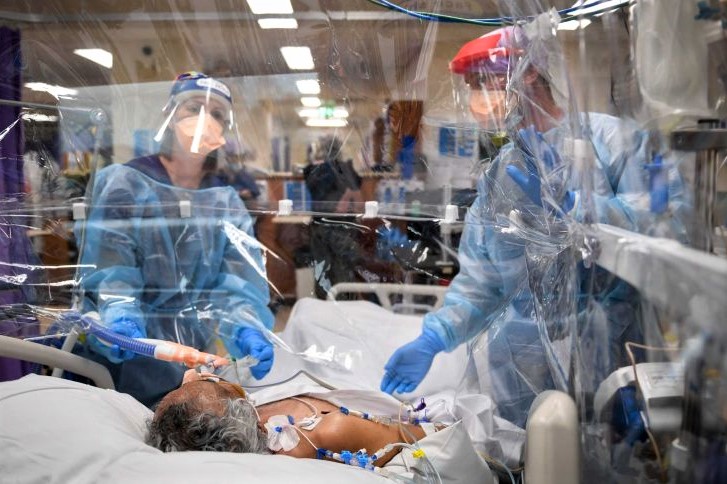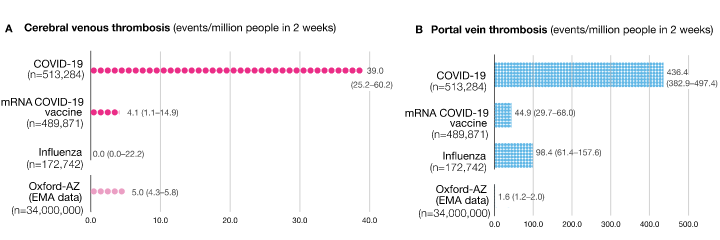
Covid-19 carries a risk of blood clots (cerebral venous thrombosis CVT) many times higher than with current vaccines
Covid-19 and blood clots (cerebral venous thrombosis CVT): Researchers at the University of Oxford have published a pre-print article in which they claim that the risk of the rare blood clot known as cerebral venous thrombosis (CVT) following Covid-19 disease is around 100 times higher than normal, many times higher than after vaccination or caused by influenza
It has long been known that other viral diseases, such as influenza, can cause clotting disorders (cerebral venous thrombosis CVT), so it is not surprising that Covid-19 also has this effect
The research team, led by Professor Paul Harrison and Dr Maxime Taquet of the University of Oxford and the NIHR Oxford Health Biomedical Research Centre, recorded the number of cases of CVT diagnosed in the two weeks following the diagnosis of COVID-19 and after the first dose of the vaccine. It then compared these with the incidences of CVT following influenza and in the general population.
The data came from the US TriNetX electronic health records network database and the EMA (European Medicines Agency) for data on the AstraZeneca vaccine, which is not used in the US.
Researchers report that Cerebral Venous Thrombosis (CVT) is more common after COVID-19 disease than in any comparison group, with 30% of these cases occurring in those under 30 years of age
Compared to current COVID-19 vaccines, this risk is 8-10 times higher, and compared to baseline data, about 100 times higher.
The detailed comparison for reported cases of CVT in COVID-19 patients compared to CVT cases in those who received a COVID-19 vaccine is:
- in over 500,000 COVID-19 patients, CVT occurred in 39 out of one million patients
- in over 480,000 people who received an mRNA vaccine (Pfizer or Moderna), CVT occurred in 4 out of a million
- CVT occurred in about 5 in 1 million people after the first dose of AZ-Oxford vaccine.
Thus:
- compared to mRNA vaccines, the risk of CVT from COVID-19 is about 10 times higher
- compared to the AZ-Oxford vaccine, the risk of CVT from COVID-19 is about 8-fold higher.
However, all comparisons should be interpreted with caution as data continue to accumulate.
 Incidence of cerebral venous thrombosis (A) and portal vein thrombosis (B) per million people in the two weeks following health events. Numbers in brackets to the right of each bar represent the 95% confidence interval. Data for the ChAdOx1 nCoV-19 vaccine are presented for reference and taken from European Medicines Agency data (published 7 April 2021).
Incidence of cerebral venous thrombosis (A) and portal vein thrombosis (B) per million people in the two weeks following health events. Numbers in brackets to the right of each bar represent the 95% confidence interval. Data for the ChAdOx1 nCoV-19 vaccine are presented for reference and taken from European Medicines Agency data (published 7 April 2021).
Paul Harrison said, “There are concerns about possible associations between vaccines and CVT, leading governments and regulators to restrict the use of certain vaccines.”
“However, one key question has remained unanswered: what is the risk of Cerebral Venous Thrombosis CVT following a diagnosis of COVID-19?”
The scientists came to two important conclusions. Firstly, COVID-19 significantly increases the risk of CVT, adding to the list of blood clotting problems caused by this infection.
Secondly, the COVID-19 risk is higher than that posed by current vaccines, even for those under 30.
This should be taken into account when considering the balance of risks and benefits of vaccination.
“These data should be interpreted with caution,” stresses Dr Maxime Taquet, “especially since the Oxford-AstraZeneca vaccine data come from EMA monitoring, while the other data use the TriNetX database.
However, the signs that COVID-19 is linked to cerebral venous thrombosis, as well as portal vein thrombosis – a coagulation disorder of the liver – are clear and we need to take note of them.”
The limitations of the study are not only that the authors were unable to examine the risks of CVT associated with the AstraZeneca vaccine in the same population.
There may also have been an underestimation or incorrect coding of CVT in the medical records and therefore uncertainty about the accuracy of the results.
Indeed, the authors could not verify the accuracy of the diagnosis of CVT, which we know is challenging, requiring adequate clinical expertise and timely scanning of brain veins.
However, the research provides important insights for further investigation, especially into the mechanisms by which COVID-19 disease and vaccines lead to CVT, which remain a mystery to date.
The better the understanding of the link between vaccination, disease and CVT, the easier it will be to contextualise the risks and help people decide whether they want to be vaccinated and whether to accept vaccination with a particular vaccine.
Read Also:
COVID-19, The Mechanism Of Arterial Thrombus Formation Discovered: The Study
The Incidence Of Deep Vein Thrombosis (DVT) In Patients With MIDLINE
Aspirin With Clopidogrel After Transcatheter Aortic Valve Implantation Or Not?
Source:
Il database statunitense TriNetX
Cerebral venous thrombosis: a retrospective cohort study of 513,284 confirmed COVID-19 cases and a comparison with 489,871 people receiving a COVID-19 mRNA vaccine
Maxime Taquet, Masud Husain, John R Geddes, Sierra Luciano, Paul J Harrison.
OSF (free, open research and enable collaboration platform), 15 aprile 2021:


